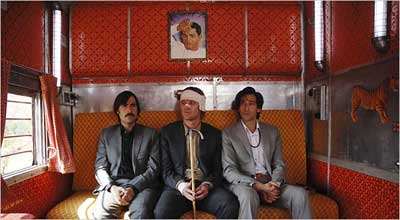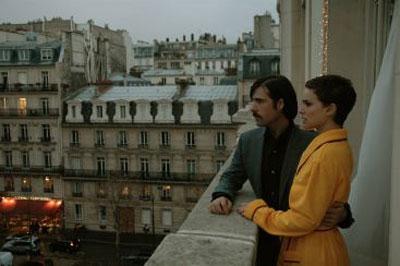
Photo Credit: James Hamilton
In Wes Anderson's first feature, Bottle Rocket, a young woman bats her eyes and says to Luke Wilson, "You're complicated, aren't you?" He pauses a moment and, with absolute sincerity, says, "I try not to be."
Anderson has never been closer to that sentiment than he was then; he's been a serial complicator ever since, taking what was interesting about his characters — their belief in organization, their anachronistic appreciation of personal objects, their wish to lead grander lives — and absorbing it into the films themselves, no longer observing these traits but embodying them, shifting his stories into ever more hermetic, romanticized locales, and indulging an over-fascination with eccentricity that once looked clever but now more closely resembles a nervous tic.
The Darjeeling Limited is, one would hope, the end of the line for this train. The film's prologue — a 13-minute short called Hotel Chevalier that won't actually screen with the movie but can be seen instead on the Internet [free here] and the eventual DVD — neatly encapsulates the film's nature. Jason Schwartzman welcomes Natalie Portman, the ex-girlfriend from whom he's running, into his Parisian hotel room. The short is immaculately shot, the spare dialogue is dryly witty, the slightly elliptical editing, although it feels sloppy at first, seems more assured as time goes on, and the ending is a muted epiphany, neither an exclamation point nor a question mark but a simple, dim period.
Anderson has an undeniable flair for visual grace, and in Hotel Chevalier he derives a good three-fifths of it from Portman, who's cute as a button in her Jean Seberg hairdo, Vulcan eyebrows, and lithe, nude poses. Anderson's camera tracks adoringly past her, or holds her just outside the frame at key moments. But, of course, his camera tracks adoringly past half of the people and vehicles in The Darjeeling Limited, usually in slo-mo as an Animals-esque guitar riff fills the theater like horses hooves in a Western.
 Photo Credit: James Hamilton
Photo Credit: James Hamilton
The prologue's muted epiphany occurs when the characters breach the membrane surrounding the hermetically sealed chamber: they step onto the balcony, get some fresh air, turn outward, and breathe life, gazing toward whatever is off the left side of the frame, a Parisian cityscape perhaps, and — given Anderson's exacting sense of the twee — a cityscape that's more likely to include the Seine than the Eiffel Tower.
But then the camera fills the blank by panning 90-degrees counterclockwise, quickly and robotically, to reveal that the couple is looking at the side of another building across the street, an attractive gray building the likes of which line every rue in Paris. It's a telling discovery; the breath of fresh air, the widening gaze, was nothing of the sort. They're outside in only the most perfunctory sense.
* * *
In The Darjeeling Limited proper, which takes place a few days later, Schwartzman joins his estranged brothers, Adrien Brody and Owen Wilson, on a train crossing India. The trip is Wilson's idea, an effort to bond with his brothers after their father's death. The interactions are mildly humorous, the rhythm is pleasant, the setting is intriguing, and the journey, we suspect, will be the reward, but before these elements have a chance to cohere, the weight of the film — the sealed tube through which the brothers move, the ever-panning camera — settles on the scene like a wool blanket on a summer day. The men grumble about their relationship with their parents, recalling The Royal Tenenbaums, but this film has no Gene Hackman to put a brick through the other guy's windshield, to take it out and chop it up. Anderson brings Bill Murray and Angelica Huston in for brief, iconic appearances, and he glimpses Portman (fully robed) once near the end of the film, but, while each of these actors precisely effects a trademark dour puss, they stand not like characters but emblems of some filmic pattern that Anderson doesn't bother to flesh out, dalliances as brief as the one that Schwartzman has with the train's stewardess, only less engaged. He honors them all with a closing montage that mirrors a moving train, like Fellini's in I Vitelloni, but I'm not sure what we're supposed to think as the camera glides past bodies we've never really been introduced to. Look, it's Bill Murray. It's Natalie Portman. It's Kumar.
In the main feature, the equivalent of the prologue's balcony scene plays out like this: the brothers are finally out of the train, thrown off for causing a commotion. (Snake. Pepper spray.) Suddenly they're walking along a rushing river when a tragedy occurs, a horrible, bloody event so finely executed that my heart began to race like the one on the soundtrack. It seemed Anderson had finally found the soul of his film. But when the senseless death turns out to be just a poetic parallel, a cosmic do-over offered generously by Great Fate, a sacrifice of a character in whom the screenplay had invested nothing anyway, Anderson has effectively panned toward a gray building instead of leaving us to imagine a cityscape.
The tragedy leads to a funeral that makes frustratingly little use of the fine actor Irfan Khan (The Namesake), who appears in what amounts to a cameo. Anderson bluntly ties the ceremony to the father's funeral using a jarring flashback that feels like a scene from Reservoir Dogs, a film that's probably closer kin to The Darjeeling Limited, with its color-coded characters, eclectic music, and slo-mo strides, than the films of Satyajit Ray or Jean Renoir that Anderson cites as inspiration. The sequence by the river is the emotional climax of the film, but its echoes are felt for another half hour or so in a series of smaller epiphanies that stem, one assumes, from the tragic moment. Anderson is too ironically deadpan to embrace any sudden transformations in his characters, so they don't seem remarkably changed by the event, which effectively reduces it to a plot point with an emotional patina, rendered impotent by a filmmaker who seems to think that he can compensate for the emptiness at his film's core just by pulling away from sentimentality. He's trying to fill one void with another.
The Darjeeling Limited premieres tonight at the New York Film Festival whose centerpiece, premiering a couple of weeks later, is a new movie from Joel and Ethan Coen. I haven't seen the latter film yet, but these filmmakers belong together. I can't remember what it felt like to look forward to a new film by the Coen brothers, but there was certainly a time when I did.
I'm beginning to feel the same about Wes Anderson.
